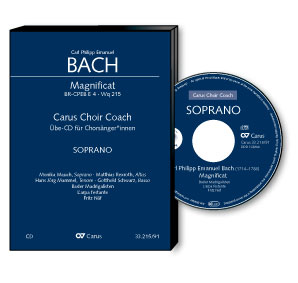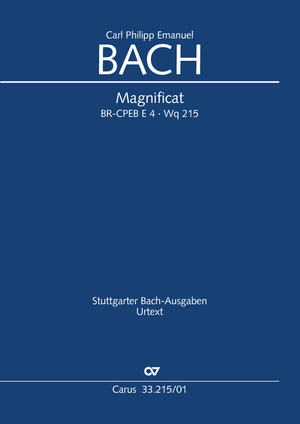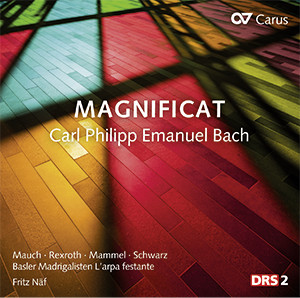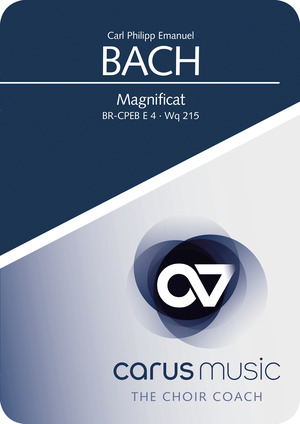
With his first major vocal work, his Magnificat of 1749, Carl Philipp Emanuel Bach created a magnificent and forward-looking setting of this well-known text, a work quite unrivalled for its time. In the choral writing, CPE Bach used a quite different style from the predominantly homophonic style of some of his later works. Unusual harmonic turns and independent part-writing in the fugal movements and elsewhere result in demanding, yet attractive parts for choral singers.
The Carus Choir Coach offers choir singers the unique opportunity to study and learn their own, individual choral parts within the context of the sound of the entire choir and orchestra. For every vocal range a separate Audio CD or MP3 and download containing each choir part is available. The Carus Choir Coach is based on recorded interpretations by renowned artists who have performed the work from carefully prepared Carus Urtext editions. Each choir part is presented in three different versions:
- Original recording
- Coach: each part is accompanied by the piano, with the original recording sounding in the background
- Coach in slow mode: the tempo of the coach slows down to 70% of the original version – through this reduction passages can be learned more effectively.
Contents
-
Composer
Carl Philipp Emanuel Bach
| 1714-1788Carl Philipp Emanuel Bach (1714–1788) was an extremely prolific composer who enjoyed a high reputation during his lifetime with the result that his music became known far and wide. The early works were influenced by the Berlin School. In his later works, however, this composer developed a thoroughly individual style, independent of contemporary fashions, which is to be found especially in the sacred vocal works written during his years as Director of Music in Hamburg (1768–1788). Personal details
-
Ensemble
L'arpa festante Barockorchester
-
Ensemble
Basler Madrigalisten
Founded by Fritz Näf, the Basler Madrigalisten (Basel Madrigalists) sing in the most diverse formations, as soloists and as a small vocal ensemble. Their large repertoire extends from the early Renaissance to the modern period. Their main emphasis is on the preparation and (first) performance of contemporary works and the revival of works from the 15th to 18th centuries. The Basler Madrigalisten have participated in the world’s leading music festivals. Concert tours have taken the choir to nearly every European country, to Russia, the USA, Lebanon and the Far East. Their recordings have received various awards. They have repeatedly gained the sponsor’s award of the Ernst von Siemens musical foundation, and in 1998 they were given the sponsor’s prize of the European Economy. The Basler Madrigalisten are supported by the cantons of the city and district of Basel, the Artephila Foundation and other foundations. Personal details
-
Conductor
Fritz Näf
| 1943Fritz Näf studied solo singing at the Musikhochschule in Zurich and Freiburg/Breisgau and attended master courses given by Jenny Tourel and Ernst Haefliger. As a tenor he appeared in concerts in many parts of Europe, while continuing his studies as a choral and orchestral conductor. Between 1976 and 1986 he taught solo and ensemble singing at the Schola Cantorum Basiliensis, where he founded the Basle Madrigalists in 1978. Between 1986 and 2000 first he was director of the Winterthur Music School and Conservatory, and subsequently rector of the newly established Hochschule for Music and Theater in Zurich. Since December 2000 Fritz Näf has been full-time artistic director of the Swiss Chamber Choir (founded in 1997) and the Basle Madrigalists. He also continues to appear as a guest conductor with various choirs and orchestras. Personal details
Frequent questions about this work
 There are no questions and answers available so far or you were unable to find an answer to your specific question about this work? Then click here and send your specific questions to our Customer Services!
There are no questions and answers available so far or you were unable to find an answer to your specific question about this work? Then click here and send your specific questions to our Customer Services!








